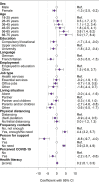Health-related quality of life before and during the COVID-19 pandemic in Switzerland: a cross-sectional study
- PMID: 37084000
- PMCID: PMC10119820
- DOI: 10.1007/s11136-023-03414-0
Health-related quality of life before and during the COVID-19 pandemic in Switzerland: a cross-sectional study
Abstract
Introduction: The COVID-19 pandemic forced people to give up their daily routines and adjust to new circumstances. This might have affected health-related quality of life (HRQOL). We aimed to compare HRQOL during the first COVID-19 wave in 2020 to HRQOL before the pandemic and to identify determinants of HRQOL during the pandemic in Switzerland.
Methods: We conducted a cross-sectional online survey during the pandemic (between May and July 2020; CoWELL sample; convenience sample). Before the pandemic (2015-2016), we had conducted a cross-sectional paper-based survey among a representative random sample of the Swiss general population (SGP sample). In both samples, we assessed physical and mental HRQOL (Short Form-36) and socio-demographic characteristics. In the CoWELL sample, we additionally assessed health- and COVID-19-related characteristics. Data were analysed using linear regressions.
Results: The CoWELL sample included 1581 participants (76% women; mean age = 43 years, SD = 14 years) and the SGP sample 1209 participants (58% women, mean age = 49 years, SD = 15 years). Adjusted for sex, age, and education, the CoWELL sample reported higher physical HRQOL (PCS, +5.8 (95% CI: 5.1, 6.6), p < 0.001) and lower mental HRQOL (MCS, -6.9 (-7.8, -6.0), p < 0.001) than the SGP sample. In the CoWELL sample, especially persons with lower health literacy, who had no support network or who have had COVID-19, reported lower HRQOL.
Discussion: Aspects unique to the COVID-19 pandemic affected HRQOL. Vulnerable persons such as those having had COVID-19, less support opportunities, and with lower health literacy are especially prone to impaired HRQOL during the COVID-19 pandemic.
Keywords: Coronavirus; Health-related quality of life; Mental health; Physical health; SARS-CoV-2; SF-36.
© 2023. The Author(s).
Conflict of interest statement
The authors have no conflict of interest for this study.
Figures



References
-
- World Health Organization (WHO). (2022). WHO Coronavirus (COVID-19) Dashboard. Retrieved from https://web.archive.org/web/20220101025644/https://covid19.who.int/
-
- Federal Office of Public Health (FOPH). (2020). New coronavirus: Federal government measures. https://web.archive.org/web/20200318221654/https://www.bag.admin.ch/bag/....
-
- Lemaitre JC, Perez-Saez J, Azman AS, Rinaldo A, Fellay J. Assessing the impact of non-pharmaceutical interventions on SARS-CoV-2 transmission in Switzerland. Swiss Medical Weekly. 2020;150:w20295. - PubMed
-
- Ware JE, Jr, Gandek B. Overview of the SF-36 health survey and the international quality of life assessment (IQOLA) Project. Journal of Clinical Epidemiology. 1998;51(11):903–912. - PubMed
MeSH terms
Grants and funding
- 20-064-GM/Research Commission of the University of Lucerne
- P2BEP3_191798/Schweizerischer Nationalfonds zur Förderung der Wissenschaftlichen Forschung
- P2LUP1_195091/Schweizerischer Nationalfonds zur Förderung der Wissenschaftlichen Forschung
- 100019_153268/Schweizerischer Nationalfonds zur Förderung der Wissenschaftlichen Forschung
LinkOut - more resources
Full Text Sources
Medical
Miscellaneous

